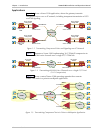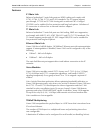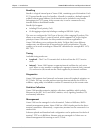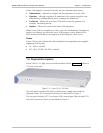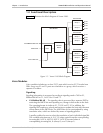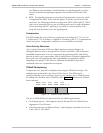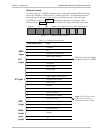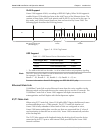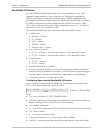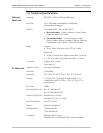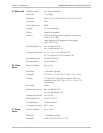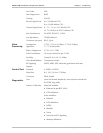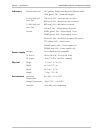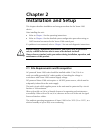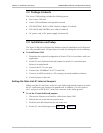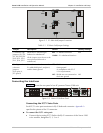
Chapter 1 Introduction Vmux-2100 Installation and Operation Manual
1-10 Functional Description
Bandwidth Utilization
By using TDMoIP multiplexing and the voice activity detection, Vmux-2100
supports a higher number of voice channels over TDM than it is possible by
utilizing conventional compression methods alone. TDMoIP multiplexing and
grouping the timeslots of compressed voice together into bundles with a common
IP address reduces the actual bandwidth used per channel to as low as 4 kbps
(16:1), when all channels are active. Better compression, up to 20:1, is achieved
when some of the voice channels are idle.
The actual bandwidth utilization is determined by the following factors:
• Header sizes:
Ethernet – 18 bytes
IP – 20 bytes
UDP – 8 bytes
TDMoIP – 4 bytes
VLAN (if exists) – 4 bytes.
• Size of the voice packet:
G.723 – 24 bytes + AAL2 header (3 bytes) + voice payload (4 bytes)
G.729 – 10 bytes + AAL2 header (3 bytes) + voice payload (4 bytes).
• Packet interval:
G.723.1 – 30 msec
G.729 – 10 msec.
• Number of timeslots in a bundle
• Silence percentage. Studies show that an average person speaks only 40% of
the time during a telephone conversation. 50% of the time is spent listening to
the other party, while the remaining 10% is spent quietly contemplating.
• Connectivity packets – 64 bytes per minute.
Calculating Approximate Bandwidth Utilization
Let us calculate an approximate bandwidth for 30 timeslots in one bundle with
G.723.1 (6.4 kbps) compression, 60 % of silence:
where:
• 50 – size of Ethernet, IP, UDP, TDMoIP headers
• 1000/40 – packets per second (pps) transmission rate, calculated according to
the packetizing interval chosen (40 msec in this example)
• 30 – number of timeslots
• 31 – size of the compressed G.732 packet plus AAL2 header and voice payload
• 0.4 – 60% of silence
• 8 – conversion from bytes to bits
• 1000 in the denominator – conversion from bits to kilobits
• 0.00853 – connectivity packets rate (64 bytes per minute) converted to kbps.
[(50 × 1000/40) + (30 × 31 × 1000/30 × 0.4)] × 8
1000
+ 0.00853
= 109.208 kbps



